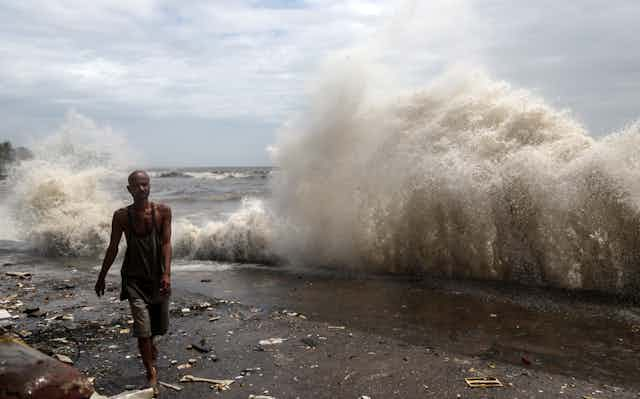Welcome to Climate fight: the world’s biggest negotiation, an expert’s guide to the UN climate talks in Glasgow from The Anthill Podcast. In the first episode of this new series, we’re talking about climate finance – money pledged by the world’s richest countries to help the poorest parts of the world adapt to and mitigate the effects of climate change. Where is it being spent and is it really working?
As hosts of COP26 – this year’s annual meeting of the UN Framework Convention on Climate Change (UNFCCC) – the UK has asked attendees to step up efforts to mobilise public and private sources of financial aid.
Developed countries agreed to raise US$100 billion a year by 2020. The most recent data only goes up to 2019, but it shows that just under US$80 billion was raised that year.
“It’s likely that we will continue to see consistent growth in climate finance mobilised over the last decade,” according to Alina Averchenkova, distinguished policy fellow at the Grantham Research Institute on Climate Change, London School of Economics and Political Science. But as for meeting the 2020 target, “Our assessment was that we’re likely to come up short.”
This is a big problem. Climate finance is supposed to help countries like Bangladesh and Mozambique, which are among the world’s poorest and most vulnerable to climate change, weather stronger storms and droughts. Since fossil fuels powered the extraction of wealth from these countries over centuries, there’s arguably a moral obligation for developed nations to help poorer countries develop sustainably by transferring money and green technology.
Failing to deliver the necessary aid on time could push the goal of net zero global emissions by 2050 out of reach, and fatally undermine faith in the world’s effort to stem climate change.
But developed countries must do more than simply meet the target. Thanks to the reporting of Maryam Charles, we’ll hear from two residents of Zanzibar about why some climate finance can leave people feeling worse off.
Some projects funded through climate finance end up depriving local people of an income, such as mangrove forest protection in Tanzania that can deny people access to a natural resource they rely on, says Jessica Omukuti, COP26 Fellow in Climate Finance at the University of York and a research fellow on inclusive net zero at the University of Oxford. “At the international level … there’s really very little thought about what 20 square miles of mangroves means for a [Tanzanian] household,” Omukuti says.
Frustration with the UNFCCC process for remedying loss and damage due to climate change is driving some people to seek compensation by other means – by suing the states and companies most responsible for the crisis. Harpreet Kaur Paul, a PhD candidate in climate justice at the University of Warwick, says that “if domestic courts start finding corporations which disproportionately contributed to the crisis have responsibilities to redress them”, it may make developed countries at COP26 “come to a political agreement about meeting financing needs”.
The Climate Fight podcast series is produced by Tiffany Cassidy with reporting in this episode from Maryam Charles in Zanzibar. Sound design by Eloise Stevens and the theme tune is by Neeta Sarl. The series editor is Gemma Ware.
A transcript of this episode is available here.
You can find us on Twitter @TC_Audio, on Instagram at theconversationdotcom or via email on podcast@theconversation.com. You can also sign up to The Conversation’s free daily email here. You can listen to The Anthill podcast via any of the apps listed above, download it directly via our RSS feed, or find out how else to listen here.
News clips in this episode from the United Nations and climatebrad.

Climate fight: the world’s biggest negotiation is a podcast series supported by UK Research and Innovation, the UK’s largest public funder of research and innovation.

